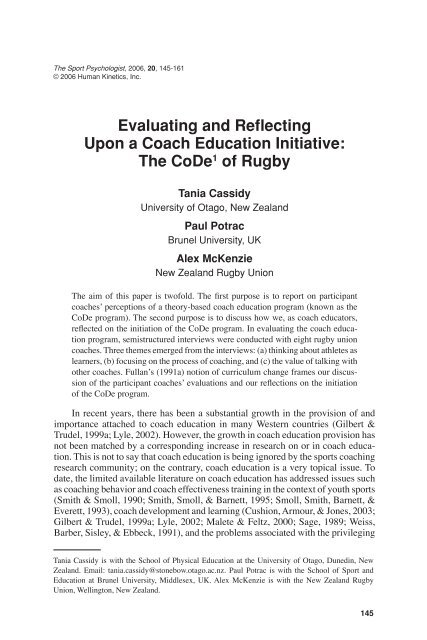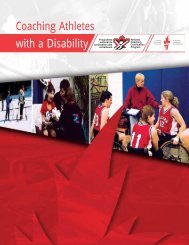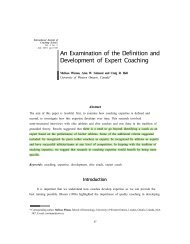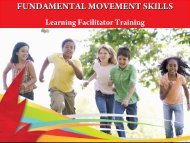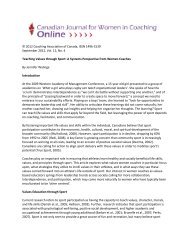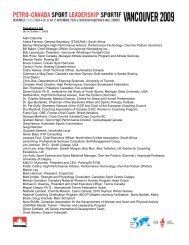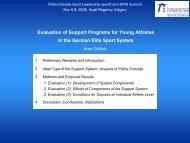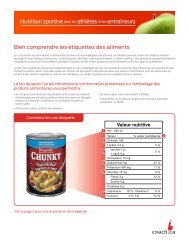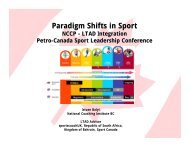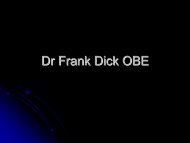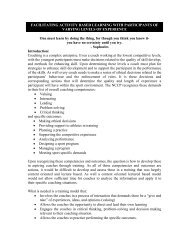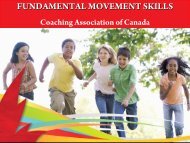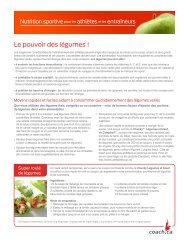Evaluating and Reflecting Upon a Coach Education Initiative: The ...
Evaluating and Reflecting Upon a Coach Education Initiative: The ...
Evaluating and Reflecting Upon a Coach Education Initiative: The ...
Create successful ePaper yourself
Turn your PDF publications into a flip-book with our unique Google optimized e-Paper software.
<strong>The</strong> Sport Psychologist, 2006, 20, 145-161<br />
© 2006 Human Kinetics, Inc.<br />
<strong>Evaluating</strong> <strong>and</strong> <strong>Reflecting</strong><br />
<strong>Upon</strong> a <strong>Coach</strong> <strong>Education</strong> <strong>Initiative</strong>:<br />
<strong>The</strong> CoDe 1 of Rugby<br />
Tania Cassidy<br />
University of Otago, New Zeal<strong>and</strong><br />
Paul Potrac<br />
Brunel University, UK<br />
Alex McKenzie<br />
New Zeal<strong>and</strong> Rugby Union<br />
<strong>The</strong> aim of this paper is twofold. <strong>The</strong> first purpose is to report on participant<br />
coachesʼ perceptions of a theory-based coach education program (known as the<br />
CoDe program). <strong>The</strong> second purpose is to discuss how we, as coach educators,<br />
reflected on the initiation of the CoDe program. In evaluating the coach education<br />
program, semistructured interviews were conducted with eight rugby union<br />
coaches. Three themes emerged from the interviews: (a) thinking about athletes as<br />
learners, (b) focusing on the process of coaching, <strong>and</strong> (c) the value of talking with<br />
other coaches. Fullanʼs (1991a) notion of curriculum change frames our discussion<br />
of the participant coachesʼ evaluations <strong>and</strong> our reflections on the initiation<br />
of the CoDe program.<br />
In recent years, there has been a substantial growth in the provision of <strong>and</strong><br />
importance attached to coach education in many Western countries (Gilbert &<br />
Trudel, 1999a; Lyle, 2002). However, the growth in coach education provision has<br />
not been matched by a corresponding increase in research on or in coach education.<br />
This is not to say that coach education is being ignored by the sports coaching<br />
research community; on the contrary, coach education is a very topical issue. To<br />
date, the limited available literature on coach education has addressed issues such<br />
as coaching behavior <strong>and</strong> coach effectiveness training in the context of youth sports<br />
(Smith & Smoll, 1990; Smith, Smoll, & Barnett, 1995; Smoll, Smith, Barnett, &<br />
Everett, 1993), coach development <strong>and</strong> learning (Cushion, Armour, & Jones, 2003;<br />
Gilbert & Trudel, 1999a; Lyle, 2002; Malete & Feltz, 2000; Sage, 1989; Weiss,<br />
Barber, Sisley, & Ebbeck, 1991), <strong>and</strong> the problems associated with the privileging<br />
Tania Cassidy is with the School of Physical <strong>Education</strong> at the University of Otago, Dunedin, New<br />
Zeal<strong>and</strong>. Email: tania.cassidy@stonebow.otago.ac.nz. Paul Potrac is with the School of Sport <strong>and</strong><br />
<strong>Education</strong> at Brunel University, Middlesex, UK. Alex McKenzie is with the New Zeal<strong>and</strong> Rugby<br />
Union, Wellington, New Zeal<strong>and</strong>.<br />
145<br />
04Cassidy(145).indd 145<br />
5/14/06 11:41:14 AM
146 Cassidy, Potrac, <strong>and</strong> McKenzie<br />
of technical, tactical, <strong>and</strong> bio-scientific knowledges <strong>and</strong> the associated technical<br />
rationality that have been characteristic features of much coach education provision<br />
(Abraham & Collins, 1998; Campbell, 1993; Potrac, Brewer, Jones, Armour<br />
& Hoff, 2000; Schempp, 1998).<br />
While such inquiry has undoubtedly provided valuable insights into the role,<br />
nature, <strong>and</strong> impact of coach education, there remains a paucity of research addressing<br />
the development of coach education curricula, coach learning <strong>and</strong> how it is to<br />
be facilitated <strong>and</strong> assessed, <strong>and</strong> how coach education serves to guide <strong>and</strong> influence<br />
coaching practice in the various contexts in which coaches operate (Gilbert<br />
& Trudel, 1999b). In addition, we argue that the findings of the available research<br />
highlight that coach education provision has, to a large degree, failed to adequately<br />
define the coachʼs educational role <strong>and</strong> function (Dils & Ziatz, 2000), effectively<br />
draw upon the coaching experiences of practitioners (Cushion et al., 2003), <strong>and</strong><br />
utilize appropriate theories of learning (Cassidy, Jones, & Potrac, 2004; Jones, in<br />
press). Given this current state of affairs, it is perhaps unsurprising that Gilbert <strong>and</strong><br />
Trudel (1999b) have suggested that the “evaluation of coach education programs<br />
has become one of the most pressing issues in sport science research” (p. 235).<br />
In an attempt to begin addressing some of the above limitations, the aim of this<br />
paper is twofold: first, to report on coachesʼ perceptions of a theory-based coach<br />
education program (known as the CoDe program) <strong>and</strong> second, to discuss how we<br />
as coach educators reflected on the initiation of CoDe program. We contend that<br />
it is important for coach educators to critically reflect upon their experiences if<br />
the value of coach education provision is to be evaluated in ways that are credible<br />
to all involved. Consequently, when reflecting upon the CoDe program after its<br />
implementation, we believe it has been useful to draw on the educational literature<br />
that focuses on curriculum development or curriculum change (e.g., Fullan, 1991a)<br />
to theoretically inform our reflections. Given the limited amount of scholarship<br />
addressing coach education, we contend the discussion in this paper is of significance<br />
to the sports coaching community because it provides a theoretically grounded<br />
empirical account of the initiation of a coach education program.<br />
CoDe Development<br />
At the beginning of 2003 the Erewhon 2 Rugby Union invited us to develop a social<br />
science theory-based coach education program for their representative coaches.<br />
That an invitation was given to two university staff (neither of whom had any<br />
connections with rugby union) to design such a coach education program is testament<br />
to the significance personal <strong>and</strong> political m<strong>and</strong>ates have in conceptualizing<br />
<strong>and</strong> selecting the content of curriculum (in this case of the CoDe curriculum). One<br />
member of the Erewhon Rugby Union who was influential in the invitation being<br />
offered, <strong>and</strong> who subsequently became involved in the initiation <strong>and</strong> delivery of<br />
the CoDe program, had previously been on staff at the university lecturing in the<br />
area of sport psychology. <strong>The</strong> other instrumental member of the Erewhon Rugby<br />
Union was the Rugby Manager who was an ex-graduate of the university. He was<br />
keen to utilize the knowledge of the staff to develop a coach education program<br />
that differed from that which other provincial development coaches would have<br />
access. His rationale was that the Erewhon Union was smaller <strong>and</strong> had less financial<br />
backing than its main rivals <strong>and</strong> therefore had to work smarter to develop a<br />
04Cassidy(145).indd 146<br />
5/14/06 11:41:18 AM
<strong>Evaluating</strong> <strong>Coach</strong> <strong>Education</strong> 147<br />
point of difference which would ideally result in an improved win loss record of<br />
its development teams.<br />
We accepted the invitation to initiate a coach education program on the proviso<br />
the Union recognized it would be a pilot program <strong>and</strong> we could invite the coaches<br />
to be interviewed at its completion. At this negotiating stage, the interviews were<br />
not being viewed as a potential data source for an empirical study. Instead, we<br />
wanted to interview the coaches at the completion of the program to gain insights<br />
into their experiences of the CoDe to assist us in our reflections <strong>and</strong> the inevitable<br />
refining of the program.<br />
We selected the content of the CoDe program based on (a) consistency with<br />
the focus requested by the Rugby Manager; (b) topics that could be informed by the<br />
disciplines of pedagogy, sociology, <strong>and</strong> psychology; (c) topics that would be able to<br />
be reflected upon by the coaches in trainings; <strong>and</strong> (d) content of two undergraduate<br />
courses <strong>and</strong> a text book that we were, at the time, in the process of co-authoring<br />
(Cassidy et al., 2004). <strong>The</strong> process we went through to select the specific content for<br />
the CoDe reflected what Connelly <strong>and</strong> Cl<strong>and</strong>inin (1991) described as a “reasoned<br />
one.” Yet, it is useful to remember that reasons are laced with political, theoretical,<br />
<strong>and</strong> personal considerations that influence what appears in a curriculum document<br />
<strong>and</strong> consequently what ends are to be achieved.<br />
Trudel <strong>and</strong> Gilbert (in press) concluded that coach development could be<br />
classified into two forms: “what coaches should know” (acquisition metaphor) <strong>and</strong><br />
“what coaches should do” (participation metaphor). While not explicitly aware when<br />
constructing the CoDe of the language Trudel <strong>and</strong> Gilbert (in press) use to describe<br />
program design, upon reflection, the design of the CoDe program incorporated elements<br />
of both forms. In relation to the former, we specified at the beginning of the<br />
CoDe program topics that we thought the coaches should know. <strong>The</strong> topics, with<br />
associated theorists, included the following: the coach as a reflective practitioner<br />
(Van Manen, 1977; Zeichner <strong>and</strong> Liston, 1987), what it means to be a quality coach<br />
(Carr, 1989), coaching methods (Mosston, 1966; Tangaere, 1997), the athlete as a<br />
learner (Fleming, & Bonwell, 2001), ethic of care (Noddings, 1992), interaction<br />
between coach <strong>and</strong> athlete (Goffman, 1959), coachesʼ roles (Callero, 1994), enjoyment<br />
profiling (Pinel, 2000), <strong>and</strong> motivation (Deci <strong>and</strong> Ryan, 1985; Nicholls 1992).<br />
<strong>The</strong> latter form of program design as described by Trudel <strong>and</strong> Gilbert (in press)<br />
was adopted in a minimal way since there was no practical component to the CoDe<br />
program nor was any assessment involved. Nonetheless, this form was reflected in<br />
the documented learning outcome of the CoDe program that claimed at the end of<br />
the course the coaches will emerge with a greater underst<strong>and</strong>ing of why, how, as<br />
well as the consequences of what they coach. To achieve this learning outcome, we<br />
stressed, throughout the duration of the CoDe program, the connection between the<br />
various topics <strong>and</strong> being a reflective practitioner. We also introduced the coaches<br />
to the action research spiral (Kemmis & McTaggart, 1992) <strong>and</strong> to tools they could<br />
use to collect data upon which they could reflect.<br />
Participants<br />
Methods<br />
Eight representative Erewhon Rugby Football Union coaches agreed to participate<br />
in the study. In this paper we have used the typologies developed by Lyle (2002)<br />
04Cassidy(145).indd 147<br />
5/14/06 11:41:18 AM
148 Cassidy, Potrac, <strong>and</strong> McKenzie<br />
<strong>and</strong> Trudel <strong>and</strong> Gilbert (in press) to present the coaches in this study as development<br />
coaches. This is because they demonstrated “high level of commitment,” their<br />
“performance objectives are more public,” there is a “less permanent relationship<br />
between coach <strong>and</strong> athletes,” <strong>and</strong> they have a truncated season (Lyle, 2002, p. 49).<br />
Furthermore, our coaches had demographic profiles similar to that of development<br />
coaches described in the review conducted by Trudel <strong>and</strong> Gilbert (in press). For<br />
example, all the coaches were male, ex-competitive athletes, <strong>and</strong> had previously<br />
attended coach education courses. <strong>The</strong>y had a mean age of 44, had on average<br />
13 years of general coaching experience, six of those at the developmental level.<br />
<strong>The</strong> most obvious difference between the CoDe coaches <strong>and</strong> those described by<br />
Trudel <strong>and</strong> Gilbert (in press) was that only 50% of the coaches in this study had<br />
an earned university degree. However, it is worth noting that in New Zeal<strong>and</strong> in<br />
the late 1970s <strong>and</strong> early 1980s, when these coaches left school, it was uncommon<br />
(less than 10% of school leavers) to attend university.<br />
CoDe Delivery<br />
With access to the coaches agreed upon, in March 2003 the CoDe program began,<br />
running over a period of 6 months with a two-hour session scheduled every two<br />
weeks. <strong>The</strong> CoDe was not a large-scale coach education program. Rather it could<br />
be described as a boutique, community-orientated, short-term (28 hours over 6<br />
months), classroom based, theoretical, educational/personal development coaching<br />
program with no assessment component that was offered free of charge to the<br />
volunteer coaches <strong>and</strong> the Erewhon Rugby Union. When comparing the CoDe<br />
program to other coach education programs such as the American Sport <strong>Education</strong><br />
Program (ASEP), it appears that the number of organizations that use, require, or<br />
recommend the Bronze level program, the topics taught, <strong>and</strong> pedagogical practices<br />
involved in the ASEP program (http://www.aesp.com/courseInfo/curriculum.cfm)<br />
are in stark contrast to the CoDe program. Furthermore, the CoDe does not attempt<br />
to integrate theory, technical, <strong>and</strong> practical components as is common in many<br />
large scale programs such as Canadaʼs National <strong>Coach</strong>ing Certification Program<br />
(NCCP). Nonetheless elements of the CoDe might be appropriately located in<br />
the Competition stream <strong>and</strong> the development context of the NCCP (http://www.<br />
coachnb.com/nccp.asp).<br />
Data Collection<br />
Consistent with much qualitative research that attempts to gain insight into participantsʼ<br />
interpretations, we used interviews to gather data. <strong>Upon</strong> the completion<br />
of the CoDe program, we invited the coaches to participate in one in-depth, semistructured<br />
interview so we could gain some insight into their perceptions of the<br />
program. <strong>The</strong> interviews lasted between 60 <strong>and</strong> 150 minutes <strong>and</strong> occurred at a<br />
location <strong>and</strong> time convenient to each coach. <strong>The</strong> interviews were reflexive in nature,<br />
in that the coaches were invited to explore certain themes with the interviewer<br />
(Sparkes & Templin, 1992). <strong>The</strong> four-part interview guide comprised a series of<br />
open-ended questions:<br />
04Cassidy(145).indd 148<br />
5/14/06 11:41:18 AM
<strong>Evaluating</strong> <strong>Coach</strong> <strong>Education</strong> 149<br />
1. Demographic <strong>and</strong> previous coaching experience (e.g., How did you get<br />
involved in coaching?)<br />
2. <strong>The</strong>ir experience with coach education programs prior to participating in the<br />
CoDe program (e.g., What knowledges <strong>and</strong> experiences have you gained from<br />
attending these courses?)<br />
3. <strong>The</strong>ir experiences of coaching at the representative level for the Erewhon Rugby<br />
Union (e.g., How does the ERFU evaluate you as a development coach?)<br />
4. <strong>Coach</strong>esʼ perspectives of participating in the CoDe program (e.g., How did<br />
the design or organization of the CoDe program conform, or not conform, to<br />
what you had experienced on your previous coach education course(s)?)<br />
Prior to beginning the interview, a consent form was collected <strong>and</strong> coaches<br />
were asked for their permission for the interview to be audio-recorded. <strong>The</strong> coach<br />
was assured that their confidentiality was a priority <strong>and</strong> anything written from<br />
the study would be given back to them to make sure that they felt comfortable<br />
with the representation. Since the interviews were initially viewed only as an<br />
opportunity for the participants to clarify their experience <strong>and</strong> for us to gain<br />
insights into their experience, the interviews were not explicitly informed by<br />
any theoretical concepts; however they were informed organizationally by the<br />
work of Patton (1990).<br />
Data Analysis<br />
When we began to develop the CoDe program, we did so from an openly ideological<br />
position in an explicit attempt to develop a coach education program that differed<br />
to that which the coaches had previously been exposed. <strong>The</strong>re was nothing neutral<br />
about our approach. When coming from this position, the concept of validity has to<br />
take on other meanings than when adopted by those who hold a parallel perspective<br />
(Sparkes, 1998). Consequently, when analyzing <strong>and</strong> presenting the data, we sought<br />
to do so in a way that gave the text a degree of verisimilitude, that is a “feeling that<br />
the experience described is lifelike, believable, <strong>and</strong> possible” (Ellis & Bochner,<br />
2000, p. 751) or a sense of “authenticity” (Adler & Adler, 1994). When writing<br />
about authenticity in qualitative sport psychology, Sparkes (1998) suggested that to<br />
achieve authenticity, the researcher has to balance perspectives, encourage learning,<br />
share knowledge, <strong>and</strong> engage in some form of social action.<br />
<strong>The</strong> interviews in this study were analyzed in light of this question: What were<br />
the coachesʼ perceptions of the CoDe program? When coding the data, we drew on<br />
procedures Strauss <strong>and</strong> Corbin (1990) called open coding, in which data are dissected,<br />
examined, compared for differences <strong>and</strong> similarities, <strong>and</strong> then scrutinized.<br />
This method of analysis is often referred to as the constant comparative method<br />
(Strauss & Corbin, 1990). <strong>Upon</strong> completing the coding process, we organized the<br />
labeled data around the theoretical concepts (an example used in this article is<br />
learning), a process Strauss <strong>and</strong> Corbin called “categorizing.” <strong>The</strong> three themes<br />
that explicitly related to the CoDe program that emerged from the interview transcripts<br />
were (a) thinking about athletes as learners, (b) the value of focusing on the<br />
process of coaching rather than only the technical aspects of what to coach, <strong>and</strong><br />
(c) the value of talking with other coaches.<br />
04Cassidy(145).indd 149<br />
5/14/06 11:41:18 AM
150 Cassidy, Potrac, <strong>and</strong> McKenzie<br />
Results<br />
In this section, we report on the above three themes that arose from an inductive<br />
analysis of the participant coachesʼ interviews.<br />
<strong>The</strong>me 1: Thinking about Athletes as Learners<br />
In the CoDe program we introduced the idea that there is an implicit relationship<br />
between the instructional methods used by coaches <strong>and</strong> the way they viewed learning<br />
<strong>and</strong> the learner. Additionally, we discussed the relationship between the coachesʼ<br />
instruction <strong>and</strong> how athletes make sense of information they receive. Further, we<br />
introduced the coaches to a tool that could help them underst<strong>and</strong> learning preferences.<br />
While there are a number of ways a coach can ascertain the learning preferences<br />
of athletes (see Rose, 1997), we used a tool (a questionnaire coined VARK,<br />
an acronym for Visual, Aural, Read/write, <strong>and</strong> Kinesthetic) developed by Fleming<br />
<strong>and</strong> Bonwell (2001). <strong>Upon</strong> completion of the VARK questionnaire the respondents<br />
can identify their learning preferences. 3 We asked the coaches in the CoDe program<br />
to complete the questionnaire, thereby determining the media through which they<br />
preferred to learn. This was a simple but graphic way to bring to the coachesʼ attention<br />
that they learn in different ways. Subsequently, the questionnaire became the<br />
platform for discussing the merits of accommodating the learning preferences of<br />
their athletes <strong>and</strong> a catalyst for reflecting on what they already did, albeit implicitly,<br />
<strong>and</strong> what they could do differently in future training sessions. <strong>The</strong> lively discussion<br />
that occurred in the CoDe session was reflected in the interview data.<br />
<strong>The</strong> majority of the coaches said that prior to being introduced to the idea of<br />
athletes as learners, they had rarely consciously considered their athletes in this<br />
vein. This was evidenced when Jim said<br />
the thing that I got out of CoDe the most <strong>and</strong> it was a real revelation for me<br />
was the different learning techniques that people have. I mean thatʼs huge, you<br />
know. I could be good at talking <strong>and</strong> 50% of the guys donʼt even want to know<br />
about it. . . . We go, “oh why arenʼt these players listening?” And itʼs because<br />
we are not relaying it properly to them in their best learning type.<br />
Similarly, Jake said knowing about the learning styles has been “ . . . a revelation<br />
to me . . . thatʼs been huge <strong>and</strong> itʼs changed my way that . . . [I] take people<br />
through new moves.” He went on to say that he now introduces the moves “in 3 or<br />
4 different types of ways, you convey it either talking, diagrams, or a combination<br />
of those things.” Even Brendan, who had confessed that he had a tendency to “run<br />
off at the mouth . . . <strong>and</strong> [didnʼt] like sitting back <strong>and</strong> saying nothing” admitted that<br />
he, <strong>and</strong> possibly others, were silenced when the material on learning preferences<br />
were raised because “no one had ever heard [that] before . . . Iʼve done no educational<br />
training so . . . it was nice to know that one.” Another coach who had plenty<br />
to say on the worth of focusing on learning preferences in the CoDe program was<br />
Robert, who said the material on the learning preferences was “not just interesting<br />
but useful.” He went on to say it was<br />
quite relevant particularly with some of the rep. teams where youʼve got different<br />
backgrounds of guys. You know weʼve got a lot of Polynesians in some<br />
04Cassidy(145).indd 150<br />
5/14/06 11:41:19 AM
<strong>Evaluating</strong> <strong>Coach</strong> <strong>Education</strong> 151<br />
of the age grade teams . . . <strong>and</strong> some of their learning styles are a lot different<br />
to a lot of the OBʼs. 4<br />
Ivan also considered the content on learning preferences to be worthwhile<br />
<strong>and</strong> saw it as a tool to assist him become more efficient. This was highlighted<br />
when he said it was “superb, especially in some of the individuals we have . . .<br />
You know you could be wasting your damn time . . . <strong>and</strong> not know it for a whole<br />
season.”<br />
While many of the coaches had not been consciously aware of the various<br />
media through which athletes learned, some coaches had previously considered<br />
the concept of learning as a consequence of them being employed in educational<br />
institutions. Yet even these coaches recognized the worth of having material on<br />
learning preferences included in the CoDe program. Simon thought the content was<br />
worthwhile because he “enjoyed” us reinforcing “the concepts <strong>and</strong> the link between<br />
teaching <strong>and</strong> coaching” <strong>and</strong> highlighting “that coaching is really about working<br />
with people <strong>and</strong> underst<strong>and</strong>ing how they learn.” Similarly, Peter commented about<br />
valuing the links between teaching <strong>and</strong> coaching being reinforced. He said in his<br />
position as a university lecturer he would “go to all this trouble of making sure you<br />
donʼt bore the shit out of them . . . <strong>and</strong> I guess I hadnʼt really necessarily thought<br />
about applying it directly to the rugby team.”<br />
A number of coaches described how having the knowledge that athletes can<br />
have different learning preferences had changed their practices. Murray said that<br />
he now used “whiteboard presentation” at the beginning of his training sessions.<br />
Similarly, Robert said that he <strong>and</strong> his co-coach Jim had “made a conscious effort<br />
to try <strong>and</strong> incorporate” the learning styles. Prior to the CoDe they had always<br />
expressed information verbally followed by a run through. Robert said he had<br />
“never been comfortable in having white board sessions because . . . I didnʼt<br />
really like them.” But he said the discussion on the learning preferences helped<br />
them to underst<strong>and</strong> an experience they had some years earlier when they were<br />
players. He explained that they had had a teammate who they had played<br />
with for the entire season but it was not until the night before the final that he<br />
“stumbled” onto<br />
what he was supposed to being doing all year. Everyone had assumed heʼd<br />
knew what he was doing. . . . He was a great player <strong>and</strong> a hard case guy but<br />
he . . . was bluffing his way through it all season. He didnʼt actually know <strong>and</strong><br />
then somebody grabbed him <strong>and</strong> said, “go there.” So if weʼd done a blackboard<br />
session or whatever he wouldʼve seen that . . . so, the more ways you can get<br />
that information through the better.<br />
As a consequence of the knowledge gained in the CoDe program <strong>and</strong> reflecting<br />
on their playing experience, as well as what they did <strong>and</strong> currently do as<br />
coaches, Robert said that they now “put everything down on paper so all our guys<br />
get . . . our basic starter moves <strong>and</strong> a lot of our calls are written down <strong>and</strong> we have<br />
a play book.” In contrast, Brendan said that he had “instinctively” used “quite a lot<br />
of different learning styles” in his coaching but he had not realized why he “was<br />
doing it” <strong>and</strong> why it “worked” so the discussion on the learning preferences had<br />
given him the knowledge to utilize the strategies more knowledgeably rather than<br />
rely on trial <strong>and</strong> error.<br />
04Cassidy(145).indd 151<br />
5/14/06 11:41:19 AM
152 Cassidy, Potrac, <strong>and</strong> McKenzie<br />
<strong>The</strong>me 2: Focusing on the Process of <strong>Coach</strong>ing<br />
<strong>The</strong> Erewhon Rugby Union had a specific m<strong>and</strong>ate when they invited us to develop<br />
the coach education program. From the outset of the CoDe program, we stressed<br />
to the coaches that we were not there to assist them with their learning of technical,<br />
rugby specific, material. Rather, it was our intention that the CoDe program<br />
highlight some of the complexities associated with the coaching process <strong>and</strong> that<br />
as a group, we could discuss possible ways of identifying <strong>and</strong> dealing with them.<br />
This approach to coach education appeared to be “totally different” to their previous<br />
experiences of coach education, rugby specific or otherwise. Brendanʼs sentiments<br />
were reflective of the other participant coaches when he said<br />
all the courses Iʼve been involved with have been predominantly specific to<br />
technical things . . . although having said that, the most recent one, <strong>and</strong> as did<br />
the level three course, had a quotient of psychology involved. . . . So there has<br />
been a bit of that [psychology] but generally speaking you guys were looking<br />
at it from a totally different point of view.<br />
All the coaches appeared to be at a point in their coaching “careers” where they<br />
wanted to know <strong>and</strong> be able to do more. Jim said he became interested in the CoDe<br />
program very early on because it<br />
was more knowledge <strong>and</strong> it sounded a bit different. And thatʼs the big thing<br />
about the CoDe program, it was not just techniques, it was about the mental<br />
side of it questioning why you coach, getting a philosophy <strong>and</strong> all those things<br />
that go through starting from there.<br />
<strong>The</strong> coaches recognized that we were not dismissing the importance of the<br />
technical aspects of rugby or coaching, <strong>and</strong> they still valued this aspect of coaching.<br />
But as Robert pointed out, while the “technical things” are “fantastic . . . what<br />
happens when it, when things donʼt work, where do you go?” For Jake the CoDe<br />
program gave him the opportunity to “look outside the square” for solutions to his<br />
rugby specific concerns. Murray viewed the value of focusing on the processes<br />
associated with coaching to be<br />
underst<strong>and</strong>ing, not the technical aspects, but the process thatʼs involved in<br />
what you need to go to the next level. Itʼs not about fronting up on a Tuesday<br />
<strong>and</strong> a Thursday. Itʼs about everything else that moves along, you know the<br />
consequences of why you did this, how youʼre going to plan to do this, you<br />
know what are the effects? What you need to look at more in depth, so itʼs<br />
more using the thought processes <strong>and</strong> stimulating your mind to come out with<br />
some better advancement in your coaching.<br />
Jim considered that the CoDe program gave him “a structure around why you<br />
did it <strong>and</strong> the reasons that you get the results.” He recognized that the value of<br />
having a structure was to reduce the possibility that everything “becomes a wee<br />
bit hit <strong>and</strong> miss. If you know the integral parts of it <strong>and</strong> the details then you can<br />
say well if I shift this, that will adjust that.”<br />
For the focus on the coaching processes to be meaningful to rugby coaches in<br />
a coach education program that was classroom based was not an easy task, <strong>and</strong> it<br />
04Cassidy(145).indd 152<br />
5/14/06 11:41:19 AM
<strong>Evaluating</strong> <strong>Coach</strong> <strong>Education</strong> 153<br />
was made harder because our intention that at the beginning of each session coaches<br />
would work together on issues that emerged from working with their rugby teams<br />
was not realized due to the policy changes of the ERFU. Nonetheless, because of<br />
the openness of the coaches to share their experiences (good <strong>and</strong> not so good), we<br />
were still able to adopt a pedagogy that resulted in the coaches discussing meaningful<br />
rugby specific examples.<br />
<strong>The</strong>me 3: <strong>The</strong> Value of Talking with Other <strong>Coach</strong>es<br />
While most coaches knew each other as a consequence of being, or having been, a<br />
coach in the local premier rugby competition or a development coach, they had never<br />
previously had any formalized opportunities to talk to each other about the practice<br />
<strong>and</strong>/or process of coaching. All the coaches agreed that having the opportunity to<br />
talk to other coaches was beneficial at some level. For Brendan, this opportunity<br />
was the highlight of participating in the CoDe program. He explained for him the<br />
benefit of talking with the other coaches was critical.<br />
I mean, being brutally honest, that was the thing I probably looked forward to<br />
most of all about the meetings. I mean I was keen to see what you guys were<br />
going to come up with this week, <strong>and</strong> what we were going to be talking about,<br />
but coming away from it, it was as much about the melding of ideas <strong>and</strong> stuff<br />
like that it was really good.<br />
He went onto say “to have that sort of forum where you could just talk <strong>and</strong><br />
even argue, even disagree with guys . . . was really good.” Particularly, he enjoyed<br />
the opportunity to talk to the other coaches about what they do with their team.<br />
Other coaches also enjoyed the sharing of ideas that occurred. For example, Jake<br />
said, “Simon <strong>and</strong> his sidekick Lou were great, they were fantastic <strong>and</strong> you could<br />
see they were head <strong>and</strong> shoulders above most of us other coaches that were there.<br />
Especially Simon being a teacher <strong>and</strong> . . . heʼs obviously been around the mill 5 a<br />
bit too.”<br />
However, other coaches, while saying they enjoyed having the opportunity to<br />
talk with the other coaches, were more circumspect in their comments. For example,<br />
Robert said that while “itʼs good to get a lot of those guys in one place <strong>and</strong> share<br />
some ideas . . . the discussions were dominated quite often by a couple of people<br />
a wee bit much.” He recognized that we<br />
were obviously keen to let it flow a bit but I wouldʼve preferred if somebody<br />
had taken control a few times <strong>and</strong> said “look this debate is great <strong>and</strong> its useful<br />
but you know weʼre sort of getting a wee bit [off] track <strong>and</strong> we need to carry<br />
on through what weʼre trying to cover.”<br />
When Brendan commented on the way we designed “tasks in a group” <strong>and</strong><br />
how the content of the CoDe “stimulated the conversation between the other<br />
coaches,” he was implicitly recognizing that merits of the pedagogy of the CoDe<br />
program. While other coaches also thought there was some merit in a pedagogy<br />
that provided them with the opportunity to talk with the other coaches about the<br />
coaching process, they pointed out that just providing a forum for coaches to be<br />
able to talk to each other is not enough in itself. Rather, the forum needed to be<br />
mediated so that participation for all coaches was meaningful.<br />
04Cassidy(145).indd 153<br />
5/14/06 11:41:19 AM
154 Cassidy, Potrac, <strong>and</strong> McKenzie<br />
Discussion<br />
<strong>The</strong> subsequent section is informed by Fullanʼs (1991a) framework of curriculum<br />
change because it is potentially generative for evaluating <strong>and</strong> reflecting on the initiation<br />
of the CoDe program. Fullan described curriculum change as happening in<br />
three broad phases, namely initiation, use, <strong>and</strong> assessment. This discussion section<br />
is organized around the assessment <strong>and</strong> initiation phases with the former being a<br />
theoretically informed discussion of the interview data reported on in the result<br />
section, while the latter is a theoretically informed discussion on our reflections of<br />
the initiation of the CoDe program.<br />
Assessment of the CoDe program<br />
<strong>The</strong>re is no agreement on the relationship between assessment <strong>and</strong> evaluation in<br />
the educational literature, yet there is an underst<strong>and</strong>ing that the interpretation,<br />
discussion, <strong>and</strong> practice of evaluation are inextricably linked to oneʼs ontological<br />
<strong>and</strong> epistemological orientation. Thus, our interviews with the participant coaches<br />
was an attempt to gain insight into what they considered to be the merit <strong>and</strong> worth 6<br />
of the CoDe program. This form of interviewing can be broadly termed qualitative<br />
curriculum evaluation <strong>and</strong> has been described as a “reflective effort to develop the<br />
fullest possible range of knowledge (including personal knowledge) about specific<br />
educational situations” (Willis, 1994, p. 1284).<br />
As highlighted in the results section, one of the key themes to emerge in relation<br />
to the coachesʼ perceptions of the CoDe program was the benefit they attached<br />
to viewing the athlete as a learner. Indeed, many of the participant coaches had not<br />
previously considered the implicit relationship that exists between the instructional<br />
methods used by coaches <strong>and</strong> the way they view athlete learning. Such a finding<br />
was somewhat surprising given that one of the principle roles of the coaches in<br />
this study was to help facilitate the development of elite young players within the<br />
Erewhon Rugby Union player development program. Nonetheless, this finding is<br />
consistent with the literature, which has suggested that the educational function<br />
of the coach has largely been ignored within existing coach education programs<br />
that have, instead, tended to prioritize knowledge related to the technical, tactical,<br />
<strong>and</strong> bio-scientific aspects of sporting performance (Jones, in press; Potrac et al.,<br />
2000).<br />
That there has been so little attention given to attempts to stimulate athlete<br />
learning or have the content make sense to athletes, we suggest drawing upon the<br />
work of Floden (1989), that it would be useful if existing coach education provision<br />
provided coaches with the opportunity to explore how their instruction looks to<br />
athletes, how athletes perceive what they are being taught, <strong>and</strong> how athletes learn<br />
content, which is in some way new or foreign to them. Consequently, we contend<br />
that coach education provision could benefit from recognizing that coaching is<br />
fundamentally intertwined with teaching <strong>and</strong> learning at the micro-interactive level<br />
within given situational constraints. According to Jones (in press), the adoption of<br />
such a perspective in coach education could help “make coaches <strong>and</strong> coach educators<br />
reflective of previously unconsidered theoretical notions thus giving them<br />
the options to think in different ways about their practice <strong>and</strong> its consequences.”<br />
A perceived strength of the CoDe program, highlighted in the second theme, was<br />
04Cassidy(145).indd 154<br />
5/14/06 11:41:20 AM
<strong>Evaluating</strong> <strong>Coach</strong> <strong>Education</strong> 155<br />
that it encouraged the participant coaches to critically reflect upon their approach<br />
to coaching. In this respect, the respondents highlighted how they valued the<br />
opportunity to examine their coaching practices in relation to theories <strong>and</strong> concepts<br />
introduced to them in the CoDe program. Indeed, this was considered by<br />
the participating coaches to be a unique feature of the CoDe program <strong>and</strong> was a<br />
process that they claimed they had not been previously encountered in the context<br />
of New Zeal<strong>and</strong> Rugby Union coach education provision. Given that prior coaching<br />
experiences <strong>and</strong> the observation of other coaches appear to be the major sources of<br />
coaching knowledge (Bloom, Schinke, & Salmela, 1997; Jones, Armour & Potrac,<br />
2003; Sage, 1989), we believe that such a process may be valuable in encouraging<br />
coaches to critique some of the common sense <strong>and</strong> dogmatic beliefs that they may<br />
have been acquired as a consequence of their socialization experiences within a<br />
particular sporting subculture (Thompson, 2000). Indeed, incorporating a reflective<br />
orientation in coach education could contribute toward providing coaches with a<br />
greater knowledge <strong>and</strong> underst<strong>and</strong>ing of why certain practices <strong>and</strong> approaches are<br />
productive or unproductive, as well as highlighting alternative strategies where<br />
appropriate (Cassidy et al., 2004; Jones, in press).<br />
<strong>The</strong> coaches also highlighted how engaging in such a reflective process had<br />
provided them with a greater sense of confidence in terms of providing their<br />
players with meaningful <strong>and</strong> productive learning experiences. This finding is in<br />
keeping with the work of Malete <strong>and</strong> Feltz (2000), which highlighted the benefits<br />
of a coach education program on coaching efficacy. We believe that the coaches<br />
participating in the CoDe program would have further benefited from the inclusion<br />
of mastery experiences within this coach education intervention. In this respect,<br />
a longer program could have provided them with opportunities to utilize, reflect<br />
upon, <strong>and</strong> collaboratively discuss the various ways in which they employed the<br />
theoretical content of the CoDe program within their respective coaching repertoires<br />
<strong>and</strong> situations.<br />
<strong>The</strong> coaches attached considerable value to the opportunity to discuss, debate,<br />
<strong>and</strong> share ideas with colleagues during each session of the CoDe program, as evidenced<br />
in the third theme. Indeed, such interactions were considered by the coaches<br />
to have made a useful contribution to their knowledge development, as well as<br />
providing them with a number of practical strategies to consider in relation to their<br />
coaching practice. Other research has also shown that coaches perceive formal <strong>and</strong><br />
informal conversations with other coaches to be as valuable to their professional<br />
development, if not more so, than the purely theoretical <strong>and</strong> cognitive knowledge<br />
delivered by coach educators as a part of formal coach education schemes (Fleurance<br />
& Cotteaux, 1999; Jones, Armour, & Potrac, 2004; Saury & Dur<strong>and</strong>, 1998).<br />
Such a situation may have occurred because these conversations are often grounded<br />
in the everyday realities of coaching <strong>and</strong>, as such, are more focused on practical<br />
solutions to the professional problems <strong>and</strong> issues that coaches have to contend with<br />
within their respective coaching environments (Jones et al., 2003). Conversely,<br />
formal coach education schemes have been criticized for not adequately drawing<br />
upon the coaching experiences of practitioners <strong>and</strong> for the delivery of knowledge<br />
in a decontexualized manner (Cushion et al., 2003; Potrac et al., 2000).<br />
In contrast to the instructor led format of much existing coach education<br />
provision in New Zeal<strong>and</strong>, the CoDe program represented, to a certain extent,<br />
a coaching community of practice. In this respect, the coaches participating in<br />
04Cassidy(145).indd 155<br />
5/14/06 11:41:20 AM
156 Cassidy, Potrac, <strong>and</strong> McKenzie<br />
the CoDe program were a group of people who shared a common concern, set of<br />
problems, <strong>and</strong> passion about a topic <strong>and</strong> who sought to deepen their knowledge<br />
<strong>and</strong> expertise by interacting on an ongoing basis (Wenger, McDermott, & Snyder,<br />
2002). Furthermore, while we as coach educators introduced theoretical concepts<br />
to the participating coaches, the emphasis was on the facilitation of discussion,<br />
interaction, <strong>and</strong> the negotiation of meaning rather than on lecturing <strong>and</strong> the prescription<br />
of coaching or theoretical principles. Similar to the findings of Culver<br />
<strong>and</strong> Trudel (in press), the coaches participating in the CoDe program considered<br />
that they had benefited from the round table discussions, yet they did voice the<br />
need for the facilitators to exert some control over the direction <strong>and</strong> length of the<br />
discussions if they were to be of optimal value. Such a notion is in keeping with<br />
the work of Wenger et al. (2002), who contended, “the most important factor in a<br />
communityʼs success is the vitality of its leadership” (p. 80).<br />
Additionally, the value coaches attached to their interactions with each other<br />
during the CoDe program supports the benefit of utilizing a situated view of learning<br />
in the design <strong>and</strong> delivery of coach education interventions (Culver & Trudel,<br />
in press; Trudel & Gilbert, 2004). Drawing on this literature could provide coach<br />
educators with a platform for the (re)examination <strong>and</strong> more theoretically informed<br />
use of coaching communities of practice, apprenticeships, <strong>and</strong> mentoring in a coach<br />
education context. In addition, viewing learning as a situated activity could support<br />
the development of curricula that focuses on the learner <strong>and</strong> learning rather than<br />
primarily on instruction <strong>and</strong> the instructor. However, if coach education schemes<br />
were to focus on learning <strong>and</strong> the learner it would require more than curriculum<br />
developers <strong>and</strong> coach educators being informed by learning theories; it would also<br />
require the learners to be viewed as a significant data source.<br />
Initiation of the CoDe Program<br />
Planning for many social practices is a very complex process, <strong>and</strong> planning for<br />
the implementation of a coach education program is no exception. Recognizing<br />
this, Fullan (1991b) claimed that one of the key tasks <strong>and</strong> goals of planning is the<br />
development of transparent <strong>and</strong> valid materials. It has been suggested that the<br />
three significant content-related issues when developing materials for curricula<br />
are (a) conceptualization of the content, (b) the selection of content items, <strong>and</strong> (c)<br />
their organization into a coherent program (Connelly & Cl<strong>and</strong>inin, 1991). Earlier<br />
in the paper, we highlighted the significance personal <strong>and</strong> political m<strong>and</strong>ates had<br />
in conceptualizing <strong>and</strong> selecting the content of the CoDe program. As such, in the<br />
subsequent section of the discussion, we are only focusing on the organization of<br />
the content.<br />
Organization of Content. A factor influencing the planning of a curriculum is<br />
the choice developers make as to what data sources are emphasized. Historically,<br />
<strong>and</strong> in an educational context, three data sources have been used: students, society,<br />
<strong>and</strong> subject matter (Klein, 1991). It is advocated that developers use all three data<br />
sources when aiming for a balanced curriculum. However, in practice, this balance<br />
is rarely achieved as often only the subject matter data are used (Klein, 1991).<br />
When organizing the content of the CoDe program, we did not explicitly consider<br />
the possible data sources; rather, we adopted the orthodox practice of using subject<br />
04Cassidy(145).indd 156<br />
5/14/06 11:41:20 AM
<strong>Evaluating</strong> <strong>Coach</strong> <strong>Education</strong> 157<br />
matter as the primary source of data. When using subject matter, there is an implicit<br />
expectation that it is organized both horizontally <strong>and</strong> vertically. <strong>The</strong> former refers<br />
to the balance <strong>and</strong> integration of curriculum content <strong>and</strong> focuses on whether it can<br />
be managed within the allocated time. <strong>The</strong> latter is concerned with the sequencing<br />
of the content throughout the curriculum with the aim of supporting the learner to<br />
“build a coherent learning structure” (Connelly & Cl<strong>and</strong>inin, 1991, p. 331).<br />
<strong>The</strong>re are advantages <strong>and</strong> disadvantages of adopting subject matter as the<br />
primary data source. One advantage of the content of the CoDe being organized<br />
around subject matter is that even though the subject matter itself may have been<br />
new to some of the participant coaches, the organization of the content was familiar.<br />
Drawing on the work of Cassidy <strong>and</strong> Tinning (2004) in a teacher education context,<br />
we recognized the importance of maintaining at least some existing routines<br />
when attempting to introduce some new <strong>and</strong> possibly challenging content material.<br />
Routines can support coachesʼ feelings of ontological security that Giddens<br />
(1991) explained as being a “ʻprotective cocoonʼ which st<strong>and</strong>s guard over the self<br />
in its dealings with everyday reality” (p. 3). Another advantage of using subject<br />
matter as the primary data source is that the advanced planning of curriculum is<br />
based upon predetermined subject matter thereby enabling the content to be taught<br />
effectively <strong>and</strong> efficiently (Klein, 1991). However, a limitation of this view is that<br />
learning can become mechanized with the emphasis being placed on just covering<br />
the content instead of the learner underst<strong>and</strong>ing the content.<br />
It has been argued that an advantage of using subject matter as the data source<br />
is that it can represent the cultural heritage <strong>and</strong> reflect the “collective wisdom of<br />
people” (Klein, 1991, p. 336). But this claim is somewhat problematic because the<br />
question then arises whose culture is being represented? In a context where coaches<br />
in a coach education program can come from all over the globe <strong>and</strong>/or identify<br />
with a range of cultures, justifying the use of subject matter on the grounds that it<br />
represents the cultural heritage of people needs to be seriously reconsidered.<br />
It was our intention that the instructional practices used in the CoDe program<br />
would enable us to draw the coachesʼ experiences <strong>and</strong> societal issues into the discussions<br />
of the subject matter. However, by failing to explicitly build the coachesʼ<br />
experiences <strong>and</strong> societal issues into the organization of the content meant that it did<br />
not reflect how we had intended to conceptualize the content, namely by integrating<br />
how one learns, how one teaches, with what is being taught (Lusted, 1986) while also<br />
acknowledging the importance of the context in which this interaction occurs.<br />
Some of the arguments against using subject matter as the primary data source<br />
include that it fragments <strong>and</strong> compartmentalizes knowledge, which can result in<br />
learners not seeing the relevance of the content <strong>and</strong> not enough attention being<br />
paid to the interests, abilities, needs, <strong>and</strong> experiences of the learner. Consequently,<br />
learners can perceive there being a lack of fit between them <strong>and</strong> the content that<br />
in turn may result in decreased motivation for learning (Klein, 1991). Our reflections<br />
on the organization of the content of the CoDe program have highlighted the<br />
advantages <strong>and</strong> disadvantages of primarily using subject matter as a data source.<br />
This insight may be valuable when evaluating coach education schemes, including<br />
those using a problem-based approach. If the curriculum is not balanced <strong>and</strong>/or there<br />
is a lack of fit between the learner <strong>and</strong> the coach education scheme, then possibly<br />
all the effort <strong>and</strong> good intentions will be for naught.<br />
04Cassidy(145).indd 157<br />
5/14/06 11:41:20 AM
158 Cassidy, Potrac, <strong>and</strong> McKenzie<br />
Conclusion<br />
<strong>The</strong> aim of this paper was twofold: first, to report on coachesʼ perceptions of a<br />
theory-based coach education initiative <strong>and</strong> second, to discuss how we as coach<br />
educators reflected on the initiation of the CoDe program. One outcome of achieving<br />
these aims is that we now consider it timely for developers of coach education<br />
schemes <strong>and</strong> coach educators to draw upon various bodies of literature. Some of<br />
this literature may be found outside of sports coaching, for example in psychology<br />
<strong>and</strong> education, to assist in the construction of new <strong>and</strong> evaluate existing<br />
coach education interventions in ways that enable coach education initiatives to<br />
be developed in an informed manner as well as facilitate <strong>and</strong> assess athlete <strong>and</strong><br />
coach learning <strong>and</strong> underst<strong>and</strong>ing. Historically, psychologists <strong>and</strong> psychological<br />
theories, namely behaviorist, cognitive, <strong>and</strong> constructivist theories, have played<br />
a large part in how learning has been understood. <strong>The</strong> opportunity now exists for<br />
sport psychologists to apply their disciplinary knowledge to practice, particularly<br />
coach education, with the aim of increasing the effectiveness <strong>and</strong> value of coach<br />
education interventions.<br />
In recent decades, educational <strong>and</strong> psychological trends have resulted in cognitive<br />
orientations to learning <strong>and</strong> constructivist views of underst<strong>and</strong>ing, gaining<br />
more favorable attention in the coaching community (Cassidy et al., 2004). Some<br />
research in sport coaching is beginning to reflect these trends by highlighting the<br />
potential benefits of utilizing a situated view of learning in the design <strong>and</strong> delivery<br />
of coach education interventions (Culver & Trudel, in press; Trudel & Gilbert,<br />
2004). Sport psychologists could utilize their underst<strong>and</strong>ing of cognitive views<br />
of learning to assist them <strong>and</strong> others develop coach education curricula that<br />
focus on the learner <strong>and</strong> learning rather than primarily on instruction <strong>and</strong> the<br />
instructor.<br />
Implicit in any discussion on learning is a view of what is considered appropriate<br />
content. Fullanʼs (1991a) framework for examining the initiation of the<br />
CoDe program was generative because it highlighted the significance personal <strong>and</strong><br />
political m<strong>and</strong>ates have in conceptualizing <strong>and</strong> selecting curriculum <strong>and</strong> enabled<br />
us to recognize how in organizing the content for the CoDe, we privileged subject<br />
matter knowledge over other data sources <strong>and</strong> the advantages <strong>and</strong> disadvantages of<br />
doing so. This highlights another opportunity for the application of sport psychology<br />
in the area of coach education. As mentioned above, Klein (1991) advocated<br />
that three data sources be used when organizing the content of curricula, namely<br />
students, society, <strong>and</strong> subject matter. Sport psychologists are knowledgeable about<br />
cognitive theories of motivation <strong>and</strong> have considerable underst<strong>and</strong>ing of the individual,<br />
therefore they should be able to make a contribution to the organization of<br />
coach education curricula in ways that enhance the possibility that leaners will be<br />
viewed as data sources.<br />
References<br />
Abraham, A., & Collins, D. (1998). Examining <strong>and</strong> extending research in coach development.<br />
Quest, 50, 59-79.<br />
Adler, P., & Adler, P. (1994). Observational techniques. In N. Denzin & Y. Lincoln (Eds.),<br />
H<strong>and</strong>book of qualitative research (pp. 377-392). London: Sage.<br />
04Cassidy(145).indd 158<br />
5/14/06 11:41:21 AM
<strong>Evaluating</strong> <strong>Coach</strong> <strong>Education</strong> 159<br />
Bloom, G.A., Schinke, R.J., & Salmela, J.H. (1997). <strong>The</strong> development of communication<br />
skills by elite basketball coaches. <strong>Coach</strong>ing <strong>and</strong> Sport Science Journal, 2(3), 3-10.<br />
Callero, P. (1994). From role-playing to role using: Underst<strong>and</strong>ing role as a resource. Social<br />
Psychology Quarterly, 57, 228-243.<br />
Campbell, S. (1993). <strong>Coach</strong>ing education around the world. Sport Science Review, 2, 62-<br />
74.<br />
Carr, W. (Ed.). (1989). Quality in teaching: Arguments for a refl ective profession. London:<br />
Falmer.<br />
Cassidy, T., & Tinning, R. (2004). ʻSlippageʼ is not a dirty word: Considering the usefulness<br />
of Giddensʼ notion of knowledgeability in underst<strong>and</strong>ing the possibilities for teacher<br />
education. Journal of Teaching <strong>Education</strong>, 15, 175-188.<br />
Cassidy, T., Jones, R., & Potrac, P. (2004). Underst<strong>and</strong>ing sports coaching: <strong>The</strong> social,<br />
cultural <strong>and</strong> pedagogical foundations of sports practice. London: Routledge.<br />
Connelly, F., & Cl<strong>and</strong>inin, D. (1991). Curriculum content. In A. Lewy (Ed.), <strong>The</strong> international<br />
encyclopedia of curriculum (pp. 330-331). Oxford: Pergamon.<br />
Culver, D., & Trudel, P. (in press). Cultivating coachesʼ communities of practice: Developing<br />
the potential for learning through interactions. In R. Jones (Ed.), <strong>The</strong> sports coach as<br />
educator: Reconceptualising sports coaching. London: Routledge.<br />
Cushion, C., Armour, K.M., & Jones, R.L. (2003). <strong>Coach</strong> education <strong>and</strong> continuing professional<br />
development: Experience <strong>and</strong> learning to coach. Quest, 55, 215-230.<br />
Deci, E., & Ryan, R. (1985). Intrinsic motivation <strong>and</strong> self determinism in human behavior.<br />
New York: Plenum.<br />
Dils, A.K., & Ziatz, D.H. (2000). <strong>The</strong> application of teacher education curriculum theory<br />
to interscholastic coaching education: Learning outcomes associated with a quality<br />
interscholastic athletic program. <strong>The</strong> Physical Educator, 57, 88-98.<br />
Ellis, C., & Bochner, A. (2000). Autoethnography, personal narrative, reflexivity. In N.<br />
Denzin & Y. Lincoln (Eds.), H<strong>and</strong>book of qualitative research (2nd ed., pp. 733-768).<br />
London: Sage Publications.<br />
Fleming, N., & Bonwell, C. (2001). How do I learn best: A studentʼs guide to improved<br />
learning. Christchurch, NZ: Fleming.<br />
Fleurance, P., & Cotteaux, V. (1999). Construction de lʼexpertise chez les entraîneurs sportifs<br />
dʼathlètes de haut-niveau français [Development of expertise in elite athletic coaches<br />
in France]. Avante, 5(2), 54-68.<br />
Floden, R. (1989). What teachers need to know about learning. Proceedings of the NCRTE<br />
Seminar for Policy Makers, February 24-26, Washington, DC.<br />
Fullan, M. (1991a). Curriculum change. In A. Lewy (Ed.), <strong>The</strong> international encyclopedia<br />
of curriculum (pp. 279-281). Oxford: Pergamon.<br />
Fullan, M. (1991b). Curriculum implementation. In A. Lewy (Ed.), <strong>The</strong> international encyclopedia<br />
of curriculum (pp. 378-384). Oxford: Pergamon.<br />
Giddens, A. (1991). Modernity <strong>and</strong> self-identity. Self <strong>and</strong> society in the late modern age.<br />
Cambridge: Polity.<br />
Gilbert, W. & Trudel, P. (1999a). An evaluation strategy for coach education programs.<br />
Journal of Sport Behavior, 22, 234-250.<br />
Gilbert, W., & Trudel, P. (1999b). Framing the construction of coaching knowledge in experiential<br />
learning theory. Sociology of Sport On-Line, 2(1). Retrieved May 23, 2005,<br />
from http://physed.otago.ac.nz/sosol/v2i1/v2i1s2.htm<br />
Goffman, E. (1959). <strong>The</strong> presentation of self in everyday life. New York: Doubleday.<br />
Jones, R. (in press). <strong>The</strong> sports coach as educator: Reconceptualising sports coaching.<br />
London: Routledge.<br />
Jones, R., Armour, K., & Potrac, P. (2003). Constructing expert knowledge: A case study of<br />
a top-level professional soccer coach. Sport, <strong>Education</strong>, <strong>and</strong> Society, 8, 213-229.<br />
Jones, R., Armour, K., & Potrac, P. (2004). Sports coaching cultures: From practice to<br />
theory. London: Routledge.<br />
04Cassidy(145).indd 159<br />
5/14/06 11:41:21 AM
160 Cassidy, Potrac, <strong>and</strong> McKenzie<br />
Kemmis, S., & McTaggart, R. (Eds.). (1992). <strong>The</strong> action research planner (3rd ed.). Geelong,<br />
Australia: Deakin University Press.<br />
Klein, F. (1991). Curriculum design. In A. Lewy (Ed.), <strong>The</strong> international encyclopedia of<br />
curriculum (pp. 335-342). Oxford: Pergamon.<br />
Lusted, D. (1986). Why pedagogy? Screen, 27, 2-14.<br />
Lyle, J. (2002). Sports coaching concepts. A framework for coachesʼ behaviour. London:<br />
Routledge.<br />
Malete, L., & Feltz, D. L. (2000). <strong>The</strong> effect of a coaching education program on<br />
coaching efficacy. <strong>The</strong> Sport Psychologist, 14, 410-417.<br />
Mosston, M. (1966). Teaching physical education. Columbus, OH: Merrill.<br />
Nicholls, J. (1992). <strong>The</strong> general <strong>and</strong> the specific in the development <strong>and</strong> expression of<br />
achievement motivation. In G. Roberts (Ed.), Motivation in sport <strong>and</strong> exercise (pp.<br />
31-56). Champaign, IL: Human Kinetics.<br />
Noddings, N. (1992). <strong>The</strong> challenge to care in schools: An alternative approach to education,<br />
New York: Teachers College Press.<br />
Patton, M. Q. (1990). Qualitative evaluation <strong>and</strong> research methods (2nd ed.). London:<br />
Sage.<br />
Pinel, B. (2000). Enjoyment-profiling: An empirical assessment in youth sport. Unpublished<br />
doctoral thesis, University of Otago, New Zeal<strong>and</strong>.<br />
Potrac, P., Brewer, C., Jones, R.L., Armour, K., & Hoff, J. (2000). Toward an holistic underst<strong>and</strong>ing<br />
of the coaching process. Quest, 52, 186-199.<br />
Rose, D. (1997). A multilevel approach to the study of motor control <strong>and</strong> learning. Boston:<br />
Allyn & Bacon.<br />
Sage, G.H. (1989). Becoming a high school coach: From playing sports to coaching. Research<br />
Quarterly for Exercise <strong>and</strong> Sport, 60, 81-92.<br />
Saury, J., & Dur<strong>and</strong>, M. (1998). Practical coaching knowledge in expert coaches: On-site<br />
study of coaching in sailing. Research Quarterly for Exercise <strong>and</strong> Sport, 69, 254-<br />
266.<br />
Schempp, P. (1998) <strong>The</strong> dynamics of human diversity in sport pedagogy scholarship.<br />
Sociology of Sport On Line, 1(1). Retrieved June 28, 2000, from http://physed.otago.<br />
ac.nz/sosol/v1i1/v1i1a8.htm<br />
Smith, R., & Smoll, F. (1990). Self-esteem <strong>and</strong> childrenʼs reactions to youth sport coaching<br />
behaviors: A field study of self-enhancement processes. Developmental Psychology,<br />
26, 987-993.<br />
Smith, R.E., Smoll, F.L., & Barnett, N.P. (1995). Reduction of childrenʼs sport performance<br />
anxiety through social support <strong>and</strong> stress-reduction training for coaches. Journal of<br />
Applied Developmental Psychology, 16(1), 125-142.<br />
Smoll, F.L., Smith, R.E., Barnett, N.P., & Everett, J.J. (1993). Enhancement of childrenʼs<br />
self-esteem through social support training for youth sport coaches. Journal of Applied<br />
Psychology, 78, 602-610.<br />
Sparkes, A. (1998). Validity in qualitative inquiry <strong>and</strong> the problem of criteria: Implications<br />
for sport psychology. <strong>The</strong> Sport Psychologist, 12, 363-386.<br />
Sparkes, A., & Templin, T. (1992). Life histories <strong>and</strong> physical education teachers: Exploring<br />
the meanings of marginality. In A. Sparkes (Ed.), Research in physical education <strong>and</strong><br />
sport: Exploring alternative visions (pp. 118-209). London: Falmer.<br />
Strauss, A., & Corbin, J. (1990). Basics of qualitative research. Grounded theory procedures<br />
<strong>and</strong> techniques. London: Sage.<br />
Tangaere, A. (1997). Mäori human development learning theory. In P. Te Whäiti, M. McCarthy,<br />
A. Durie (Eds.), Mai I Rangiätea. Mäori Wellbeing <strong>and</strong> Development (pp. 46-59).<br />
Auckl<strong>and</strong>, New Zeal<strong>and</strong>: Auckl<strong>and</strong> University Press.<br />
Thompson, N. (2000). <strong>The</strong>ory <strong>and</strong> practice in human services. Maidenhead, Berkshire, UK:<br />
Open University Press.<br />
04Cassidy(145).indd 160<br />
5/14/06 11:41:21 AM
<strong>Evaluating</strong> <strong>Coach</strong> <strong>Education</strong> 161<br />
Trudel, P., & Gilbert, W.D. (in press). <strong>Coach</strong>ing <strong>and</strong> coach education. In D. Kirk, M.<br />
OʼSullivan, & D. McDonald (Eds.), H<strong>and</strong>book of Physical <strong>Education</strong>. London:<br />
Sage.<br />
Trudel, P., & Gilbert, W. (2004). Communities of practice as an approach to foster ice<br />
hockey coach development. In D.J. Pearsall & A.B. Ashare (Eds.), Safety in ice hockey:<br />
Fourth volume ASTM STP 1446 (pp. 167-179). West Conshohoken, PA: ASTM International.<br />
Van Manen, M. (1977). Linking ways of knowing with ways of being practical. Curriculum<br />
Inquiry, 6, 205-228.<br />
Weiss, M.R., Barber, H., Sisley, B.L., & Ebbeck, V. (1991). Developing competence <strong>and</strong><br />
confidence in novice female coaches: II. Perceptions of ability <strong>and</strong> affective experiences<br />
following a season-long coaching internship. Journal of Sport <strong>and</strong> Exercise<br />
Psychology, 13, 336-363.<br />
Wenger, E., McDermott, R., & Snyder, W. (2002). Cultivating communities of practice: A<br />
guide to managing knowledge. Boston, MA: Harvard University Press.<br />
Willis, G. (1994). Curriculum evaluation: Qualitative. In T. Husén & T.N. Postlethwaite<br />
(Eds.), <strong>The</strong> international encyclopedia of education (2 nd ed., vol. 3, pp. 1284-1288).<br />
Oxford: Pergamon.<br />
Zeichner, K. <strong>and</strong> Liston, P. (1987). Teaching student teachers to reflect. Harvard <strong>Education</strong>al<br />
Review, 1, 23-48.<br />
End Notes<br />
1. In the New Zeal<strong>and</strong> rugby union context, “code” is a slang word for playing the game of<br />
rugby, for example “letʼs play some code.” When constructing the coach education program, we<br />
knew this word was in the vocabulary of the rugby coaches so we used it but gave it another<br />
meaning. We used CoDe to mean <strong>Coach</strong> Development. So it was the CoDe of the code.<br />
2. This is a pseudonym.<br />
3. Fleming & Bonwell (2001) noted, “preferences are not the same as strengths” (p. 69).<br />
4. OBʼs is an abbreviation for Erewhon Boys High School, which could be viewed as a traditional<br />
state single sex school.<br />
5. A slang term for having had some experience.<br />
6. According to Willis (1994), merit “deals with value in terms of doing it in the first<br />
place . . . <strong>and</strong> its worth with whether it emphasizes trivial or significant topics” (p. 1286).<br />
Manuscript submitted: July 15, 2005<br />
Revision received: February 25, 2006<br />
04Cassidy(145).indd 161<br />
5/14/06 11:41:22 AM


